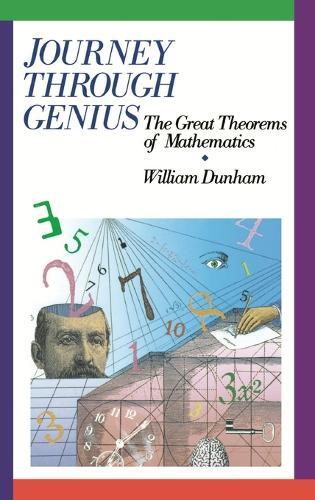Overview
"Praise for William Dunham s Journey Through Genius The GreatTheorems of Mathematics ""Dunham deftly guides the reader throughthe verbal and logical intricacies of major mathematical questionsand proofs, conveying a splendid sense of how the greatestmathematicians from ancient to modern times presented theirarguments."" Ivars Peterson Author, The Mathematical TouristMathematics and Physics Editor, Science News ""It is mathematics presented as a series of works of art; afascinating lingering over individual examples of ingenuity andinsight. It is mathematics by lightning flash."" Isaac Asimov ""It is a captivating collection of essays of major mathematicalachievements brought to life by the personal and historicalanecdotes which the author has skillfully woven into the text. Thisis a book which should find its place on the bookshelf of anyoneinterested in science and the scientists who create it."" R. L.Graham, AT&T Bell Laboratories ""Come on a time-machine tour through 2,300 years in which Dunhamdrops in on some of the greatest mathematicians in history. Almostas if we chat over tea and crumpets, we get to know them and theirideas ideas that ring with eternity and that offer glimpses intothe often veiled beauty of mathematics and logic. And all the whilewe marvel, hoping that the tour will not stop."" Jearl Walker,Physics Department, Cleveland State University Author of The FlyingCircus of Physics"
Full Product Details
Author: William Dunham
Publisher: John Wiley & Sons Inc
Imprint: John Wiley & Sons Inc
Dimensions:
Width: 16.00cm
, Height: 2.80cm
, Length: 23.60cm
Weight: 0.624kg
ISBN: 9780471500308
ISBN 10: 0471500305
Pages: 320
Publication Date: 18 April 1990
Audience:
College/higher education
,
Professional and scholarly
,
Postgraduate, Research & Scholarly
,
Professional & Vocational
Format: Hardback
Publisher's Status: Active
Availability: Out of stock

The supplier is temporarily out of stock of this item. It will be ordered for you on backorder and shipped when it becomes available.
Reviews
An eloquent exposition of what Dunham (Mathematics/Hanover) calls the Mona Lisas or Hamlets of mathematics - 12 classic theorems ranging from Hippocrates' quadrature of the lunes (c. 440 B.C.) and Euclid's proof of the Pythagorean theorem (c. 300 B.C.) to Georg Cantor's theorem of the non-denumerability of the continuum (1874) and his crowning achievement, Cantor's Theorem (1891), which, as Dunham puts it, pushed mathematics into unexplored territory where it began to merge into the realms of philosophy and metaphysics. Dunham brackets his explanation of each theorem with an accessible discussion of the state of mathematics - and of the world - prior to the theorem, and relevant biographical information about the mathematicians. The theorem explanations themselves, for all their elegance, require a current familiarity with high-school-level math; while not for many of us, then, Dunham's fine tour through the best of mathematics will prove a treat for those who know the difference between a finite cardinal and an infinite one. (Kirkus Reviews)
Author Information
"About the author WILLIAM DUNHAM is a Phi Beta Kappa graduate of the University of Pittsburgh. After receiving his PhD from the Ohio State University in 1974, he joined the mathematics faculty at Hanover College in Indiana. He has directed a summer seminar funded by the National Endowment for the Humanities on the topic of ""The Great Theorems of Mathematics in Historical Context."""




